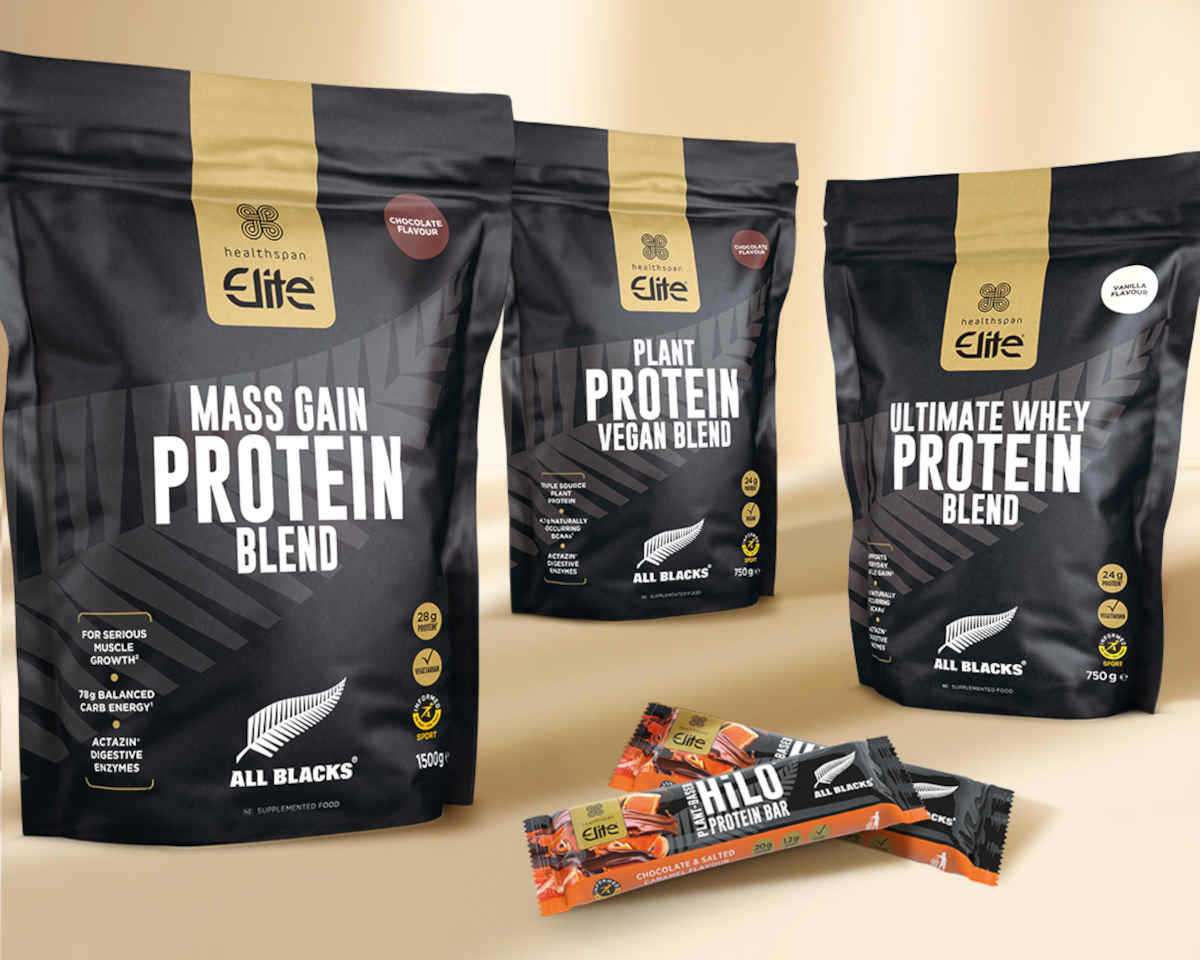🕒 6 min read
Sports nutritionist Rob Hobson brings you the science behind the top 5 foods to help you build muscle.
Achieving a muscular physique is a goal cherished by many, but few realise the dedicated blend of targeted exercise and nutritional strategy it demands. This objective is not solely the preserve of powerlifters, wrestlers, and other strength athletes. In fact, anyone, whether aiming for a lean or more robust build, can tap into these techniques for body transformation.
THE SCIENCE OF MUSCLE BUILDING
Before diving into the foods that can help you build muscle, it's essential to understand the underlying mechanics of muscle growth. Muscles increase in size through hypertrophy – a process triggered by resistance training.
During such workouts, minute tears occur within the muscle fibres. The subsequent repair of these fibres results in muscle growth, underlining the necessity of balancing strenuous exercise with sufficient rest periods.
But here's the catch: muscle-building is not just about hitting the gym. Nutrition plays a crucial role. A diet aimed at muscle growth should not only support fibre repair but also maintain overall health to sustain regular training regimes.
PROTEIN: THE BUILDING BLOCK OF MUSCLES
At the core of muscle repair and growth is protein. As proteins break down, they yield amino acids, which facilitate the reconstruction of muscle fibres. Thus, the equilibrium between muscle protein synthesis and breakdown dictates the magnitude of muscle growth. Post-exercise, consuming an ample amount of protein can tip this balance towards muscle growth.
However, a frequent question is: How much protein should I eat?
For athletes, the daily recommended intake ranges between 1.2-2g per kg of bodyweight, a figure significantly above the general population's 0.75g/kg intake. So, someone weighing 70kg would target a daily protein consumption of 91-119g. For those aiming to shed weight while retaining muscle, a higher protein intake (1.8g to 2.7g per kg/bodyweight), combined with a 15% calorie deficit, is advisable.
The timing of protein intake is equally crucial. Aim for 25g within an hour post-workout, infused with 2-3g of leucine, an amino acid known to stimulate muscle protein synthesis.
It's also wise to spread out protein consumption throughout the day, ensuring a steady influx of amino acids for muscle growth. The anabolic (muscle-building) window has been shown to stay open for up to 24 hours after training, so drip-feeding the body with protein every 3-4 hours is just as important as the post-training dose. You should aim for at least 20g of protein per meal.
The branched-chain amino acid leucine is essential for muscle growth to take place, as it initiates the process of building and regenerating muscle (muscle protein synthesis), which is important for people trying to increase their mass. Leucine increases muscle protein synthesis by stimulating the mTOR signalling pathway, which results in new muscle proteins.
Those following a plant-based diet can combine protein foods to get 2-3g leucine per meal.
CARBOHYDRATES: MORE THAN JUST ENERGY
Carbs are not merely about energy. In the context of muscle building, they play a pivotal role. Carbohydrates fuel workouts, ensuring maximum muscle stimulus. They also safeguard protein. This is because depleted glycogen stores can prompt the body to derive energy from amino acids – potentially hampering muscle growth.
After a high-intensity session, a 3:1 carbohydrate-to-protein ratio can be ideal for both glycogen restoration and muscle building – think a banana and a 600ml milk or protein shake.
Whey protein, clear protein, vegan protein and protein bars: the Healthspan Elite protein range has been developed with the All Blacks and uses the highest-quality protein sources to help you achieve your goals.
MUSCLE FOODS: THE FANTASTIC FIVE
1. CHICKEN BREAST
Protein Punch: 24g per 100g.
Leucine Load: 80g chicken gives 2g leucine.
Muscle Magic: This lean meat is packed with protein, which is essential for muscle repair and growth. Chicken also provides essential vitamins and minerals, especially B vitamins, which play an important role in converting food into energy to help fuel your workouts.
Incorporation Ideas: Chicken is very versatile and works well in a simple stir-fry, or grilled plain. You can also use chicken mince as an alternative to red meat in dishes like chilli, or combine with sliced spring onions and herbs and roll into meatballs served with spaghetti and spicy tomato sauce.
2. EGGS
Protein Punch: 13g per 2 eggs.
Leucine Load: 4 eggs contain 2g leucine.
Muscle Magic: Eggs are a powerhouse of protein. The yolk contains vitamin D, crucial for bone health and muscle function, as well as supporting immunity during the winter months, helping to see off colds and coughs. Additionally, eggs contain leucine, an amino acid essential that the body relies on for muscle protein synthesis, making them a great post-workout breakfast option.
Incorporation Ideas: Eggs can be used to make a meal at any time of day, and are also a cost-effective protein option. Try scrambled eggs with smoked salmon for an extra shot of vitamin D, or shakshuka (baked eggs in spicy tomato sauce) for a quick and easy evening meal or weekend brunch.
3. GREEK YOGURT
Protein Punch: 10g per 100g yoghurt.
Leucine Load: 200g contains 2g leucine.
Muscle Magic: Like all dairy foods, yoghurt has a unique blend of fast-digesting whey protein and slow-digesting casein protein, making it highly effective for muscle growth. Yoghurt makes a great bedtime snack to help with muscle growth while you sleep, as it drip-feeds the body with protein.
Incorporation Ideas: Yoghurt can be added to smoothies, porridge, and breakfast cereal to help boost the protein content. Try also adding a dollop of yoghurt to vegetarian protein-based meals like chilli, soups and stews made with tofu, Quorn or legumes.
4. TOFU AND OTHER SOY FOODS
Protein Punch: 9g per 100g.
Leucine Load: 220g gives 2g leucine.
Muscle Magic: For those on a plant-based diet, tofu is a protein saviour as it is one of the few plant-based proteins to contain all the essential amino acids.
Tofu is made from soyabeans, which can be eaten alone (edamame beans) or used to make other foods such as milks, tempeh, and miso. As well as protein, tofu and other soy foods are rich in calcium that supports bone and muscle strength as well as muscle function, and iron to support healthy red blood cells that deliver oxygen around the body.
Incorporation Ideas: Tofu can be added to smoothies to boost their protein content or added to stir-fries and curries in place of meat. Edamame beans are also easy to include in your diet and can be eaten as a snack on their own, made into a dip or added to salads and stir-fries.
5. ALMONDS
Protein Punch: 21g per 100g.
Leucine load: 130g almonds gives 2g leucine.
Muscle Magic: Almonds are a good source of protein and a healthy way to increase your overall energy intake, which is important when trying to gain muscle mass.
These nuts are also rich in calcium and magnesium to help support muscle function. A published study conducted by the Almond Board of California found that a serving of almonds helped to reduce fatigue, tension and muscle soreness during recovery, and decreased muscle damage during the first day of recovery post-exercise. These findings are likely due to the healthy fats and vitamin E content.
Incorporation Ideas: Almonds are a perfect snack to keep in your kit bag to keep yourself topped up with protein throughout the day. These nuts also make a great protein booster to any meal, and you can add them on top of salads or incorporate them into grain dishes such as couscous. Ground almonds can also be used to make homemade protein bars alongside mashed chickpeas, honey and nut butter.
Building muscle is part science, part art. While workouts craft the canvas, nutrition paints the masterpiece, providing you with the nutrients to support muscle growth.
Sports nutritionist Rob Hobson brings you your guide to the top supplements to supercharge your muscle-building journey.











